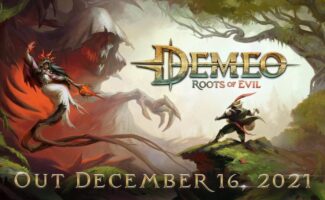After a few months off, it’s a special sort of warming to find that not much has changed with Demeo.
It’s still a fantastically fluid bit of cooperative gameplay (and a much better place to casually talk over work plans and scheduling conflicts than Workrooms, for my money), with brilliantly authentic touches. But, even with the addition of a fifth class, it also remains a brutally punishing test of patience, the slightest fault in which will quickly cost you an hour or more of progress.
Some things never change, then.
Roots of Evil, as today’s third campaign is labeled, sticks close to the formula of the first two campaigns in Resolution’s tabletop dungeon crawling delight. Only things are now decidedly less dungeon-y; the muddled mazes and filthy sewers that came before have been swapped out in favor of moody forests. It’s not your typical visual showcase of lush, leafy-green vegetation that gently sways in the breeze but instead a tonally in-step series of twisted trees and thorny bushes obscuring decaying ruins. In other words, in the world of Demeo, it looks exactly the part.
Residing within this overgrown labyrinth are enemies both old and new. Dog-like Root Hounds seem to be the new rats, swarming the map in number, but you can discover cards that will turn them into allies – a small tweak that can just about tip the scales in some tighter situations.
More immediate, though, is the game’s first new class, The Bard. Tradition dictates that this class will buff teammates. And, to some degree, he does fulfill that role with a regenerating ability to charge a single player’s courage, in turn increasing their defense and attack power for a limited time. It’s a crucial addition given the game’s diamond toughness, but it doubles down on the need for a slow and steady approach, as it can only be applied to one user per turn.
More unexpected, though, is the Bard’s ability to fight back. A quick play of his lute can summon a deadly cyclone that will occupy one tile and move with a mind of its own between turns. It’s best to toss it into an area like a cluster grenade and then run like hell, as there’s a decent chance you’re the one it’ll end up doing any damage to.
What remains consistent amongst all these changes, then, is Demeo’s show of brute force difficulty. I had forgotten just how mercilessly the game will throw enemies at you, often before you’ve even ventured too far from your starting location. The game becomes less about hunting the map for the way forward and more about surviving an onslaught, hoping the key will somehow stumble into your lap in the meantime.
As a long-time turn-based tactics fan, I always welcome the challenge. But I do wonder how Demeo must appear to those a little less experienced with the genre, or at least those with less patience for it. Is the deadly cycle of death balanced enough to encourage repeated tries, or do most simply throw in the towel after their fourth or fifth unforgiving slaughter? Suffice to say I think a more balanced difficulty mode would be a welcome addition to the game’s just-announced 2022 roadmap.
But, if you loved what was on offer with Demeo’s base launch and Realm of the Rat King expansion, there’s little reason not to jump into Roots of Evil. There’s enough new twists here to give your party of 4 some welcome new challenges, and it’s great to see the game quite literally branching out (sorry) into new territory. VR’s best social gaming experience just keeps getting better.





